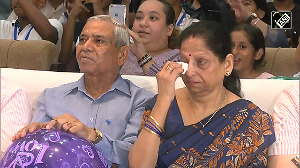The Conservative government in Canada wants to "significantly deepen its ties with India," Conservative member of Parliament Deepak Obhrai, parliamentary secretary to Peter McKay, minister for foreign affairs, said.
Obhrai delivered the opening keynote address at the day-long conference 'India Emerging - Implications for Canada' held on Friday at the Department of Foreign Affairs in Ottawa.
The conference is organised by the Canadian Institute for International Affairs.
"I believe Canada must partner with India in support of our security and economic interests," said Obhrai.
"We know as we pursue our relationship with India, we do so with a country that shares our fundamental values," Obhrai added.
India, he said, "is interestingly important in virtually all aspects of international relations in the next decade and beyond (as) India's emerging global power status and growing influence on the world stage is clear."
Obhrai then gave some statistics on the Indian economy, like India being "the world's 12th largest economy with its market projected to be worth $400-billion by 2010 in terms of purchasing power parity." He said India's growth remains robust and India's high growth means vast opportunity for Canada to sell its natural resources to India.
Obhrai in fact repeated what McKay said at the Canada-India Business Council Diwali dinner in Toronto a few weeks ago and that being challenges to India's future growth as "foreign access to the Indian market remains heavily restricted"; a significant challenge is "India's poor and over-burdened infrastructure"; and there are "obstacles to gaining access to Indian markets" and those obstacles being high tariff rates and "foreign direct investment is not permitted in agriculture", etc.
Speakers included Gowher Rizvi of Harvard University, Teresita C Schaffer, director of South Asia Program, Center for Strategic and international Studies in Washington; Devesh Kapur of the University of Pannsylvania; Kanti Bajpai of Jawaharlal Nehru University; John R Wood of South Asia Research, University of British Columbia, and dozens of other scholars.
There were a total of five sessions that covered the Indian economy, politics and society, India and the world and Canada and Emergent India.
The discussions includes topics like 'What does it mean to have an emerging India'; 'How will India behave as a major player on the world stage?'; 'India's transformation from an inward focused to an outward-looking economy that has now yielded great dividends for India'; 'What are the politics and social strengths and weaknesses in India's emergence' and 'the role of India's vibrant civil society' etc.
In terms of India's role globally, the conference discussed strategic features of India's global emergence and implications for Canada of an emergent India and its new partnership with the US.
Deepak Obhrai is a proponent of the free trade agreement with India. In his presentation, he emphasised that the Canadian Government "will aim to establish a free trade agreement with India, and we are optimistic that we will get there", but he conceded, "it will require hard work."
He also referred to Canada's increasing needs for "highly-skilled immigrants from India" as "it is beneficial to our economic growth and business connectivity" and "we will continue to attract the best and the brightest."
To his dismay, foreign-direct investments between two countries remain "relatively small" -- Cdn$145-million Indian investment in Canada and $204 million Canadian direct investment into India."
"We can do much better," he concluded.





